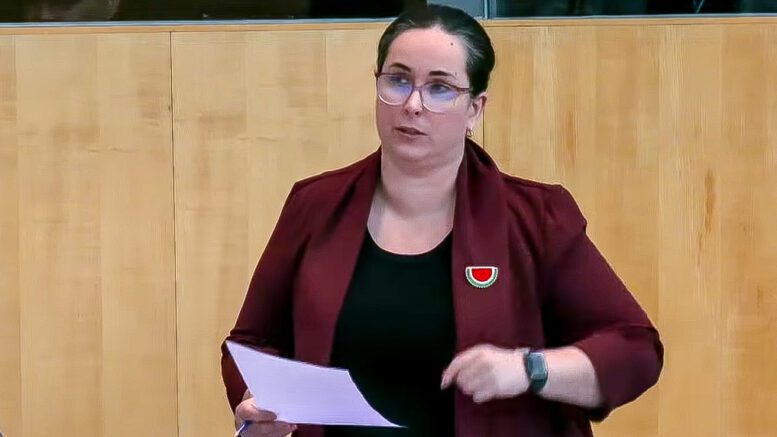Morale among unionized GNWT employees is “at rock bottom,” with many feeling stuck within a hierarchy that expects unthinking loyalty, but does not reward creativity, an MLA and former union leader told the NWT Assembly today.
 Great Slave MLA Kate Reid pointed to the results of the 2023 employee engagement and satisfaction survey, in which many stated that they are less satisfied with their jobs as compared to 2021.
Great Slave MLA Kate Reid pointed to the results of the 2023 employee engagement and satisfaction survey, in which many stated that they are less satisfied with their jobs as compared to 2021.
“Members are telling the Union of Northern Workers leadership they are stressed to hear their employer constantly talk about ways to save money,” the MLA said. “Unfilled positions are being cut while operational bottlenecks are not being addressed.
“Usually, after a collective agreement is ratified, members feel a bit of positivity, but the UNW is not hearing much of that right now, unionized employees tell their leadership that they are still stressed about finances, while at the same time feeling like an axe is sitting above their heads.”
At the start of October, the UNW and GNWT ratified a new collective agreement, backdated to April 2023 and running till March 2026.
In addition to pay raises, it also provides Indigenous staff with four days of paid cultural leave annually.
In response to Reid’s questioning, Finance Minister Caroline Wawzonek provided a sneak peak into the 2023 to 24 Public Service Annual Report, which she planned to table next week.
“I can tell you that it’s going to be tabled here in the House next week, and so certainly don’t want to give too much away. But in the theme of a teaser, let’s say that the number of exits by resignations is down from 523, down to 480, in 2023 to 2024.”

A rendering of the new Tulita Health Centre, which should have opened in 2021. (Image courtesy of GNWT)
She added the number of employee exits were generally down overall from 951, in 2022 to 23 to 810 2023 to 24.
Said the Minister: “I do want to acknowledge that it is critical that the public service return to a place of good morale. It’s been a difficult few years in the territory for a number of reasons, and that will no doubt affect people’s state of well-being in the workplace as well as elsewhere.”
To start the afternoon’s session, Minister Wawzonek updated the Assembly on the status of the Mackenzie Valley Highway project, seen as a absolute necessity, given the changing climate affecting eater levels on the river.
While discussions over the project starting as early as the 1970s, Wawzonek did have some modest progress to report.
“While we do not yet have construction funding in place, I want to reassure residents that we are actively working to update construction cost estimates and engage with (the Government of) Canada on potential funding opportunities,” she said.
Over the years, extensive planning and consultation have taken place to ensure that this project respects the land and the communities it will serve.
Earlier this year an MOU was inked between the GNWT and Sahtu Secretariat Incorporated, to help secure funding and to ensure the project that is not only economically beneficial but also culturally sensitive and environmentally responsible, said Wawzonek.
While the GNWT hasn’t broken ground on the Mackenzie Valley Highway yet, the 6.7-kilometre Prohibition Creek Access Road and Canyon Creek Road, there are now a total of 20.7 kilometres of the seasonal Mackenzie Valley Winter Road accessible year-around.

Health and Social Services Minister Lesa Semmler in the Assembly Thursday. (Image courtesy of Assembly livestream)
Yellowknife Centre Robert Hawkins suggested Health Minister Lesa Semmler had been “quiet quitting,” as the health-care system has so many problem areas that never seem to be remedied.
Premier R.J. Simpson, in his role as Government House Leader objected to the term. Speaker Shane Thompson then asked for Hawkins to withdraw the comment, which he did.
Sahtu MLA Danny McNeely inquired as to the status of the new health centre in Tulita, which was to have opened in 2021.
Minister Semmler said work resumed this past summer, with a completion target in 2026. The project was a victim of the pandemic disruptions, then the cancellation of the barge deliveries on the Mackenzie River due to low water levels. Materials for the health centre had to be flown in.
And it was announced that Chris Comeau has been appointed as the NWT Legislative Assembly’s Sergeant-at-Arms, succeeding Floyd Powder.
Originally from Hay River and now residing in Yellowknife, Comeau brings over 26 years of public service experience with the GNWT.
He has previously served as Deputy Warden and an Adjudication and Investigations Specialist.
“His leadership and expertise in security make him a valuable asset to the legislative Assembly,” Speaker Shane Thompson stated in a news release.
Members applauded Powder, carrying the ceremonial mace, as he led the procession into the chamber this afternoon.
The session resumes on Tuesday at 1:30 p.m.

Floyd Powder turns over the ceremonial mace to new Sergeant-at-Arms Chris Comeau in the NWT Legislative Assembly today. (Collage courtesy of NWT Assembly)
— story included files from CKLB’s Josie Wu.
UPDATE: The featured, or main photo, at the top of this article had been of the new Sergeant-at-Arms, but in isolation with the main headline was misleading.





